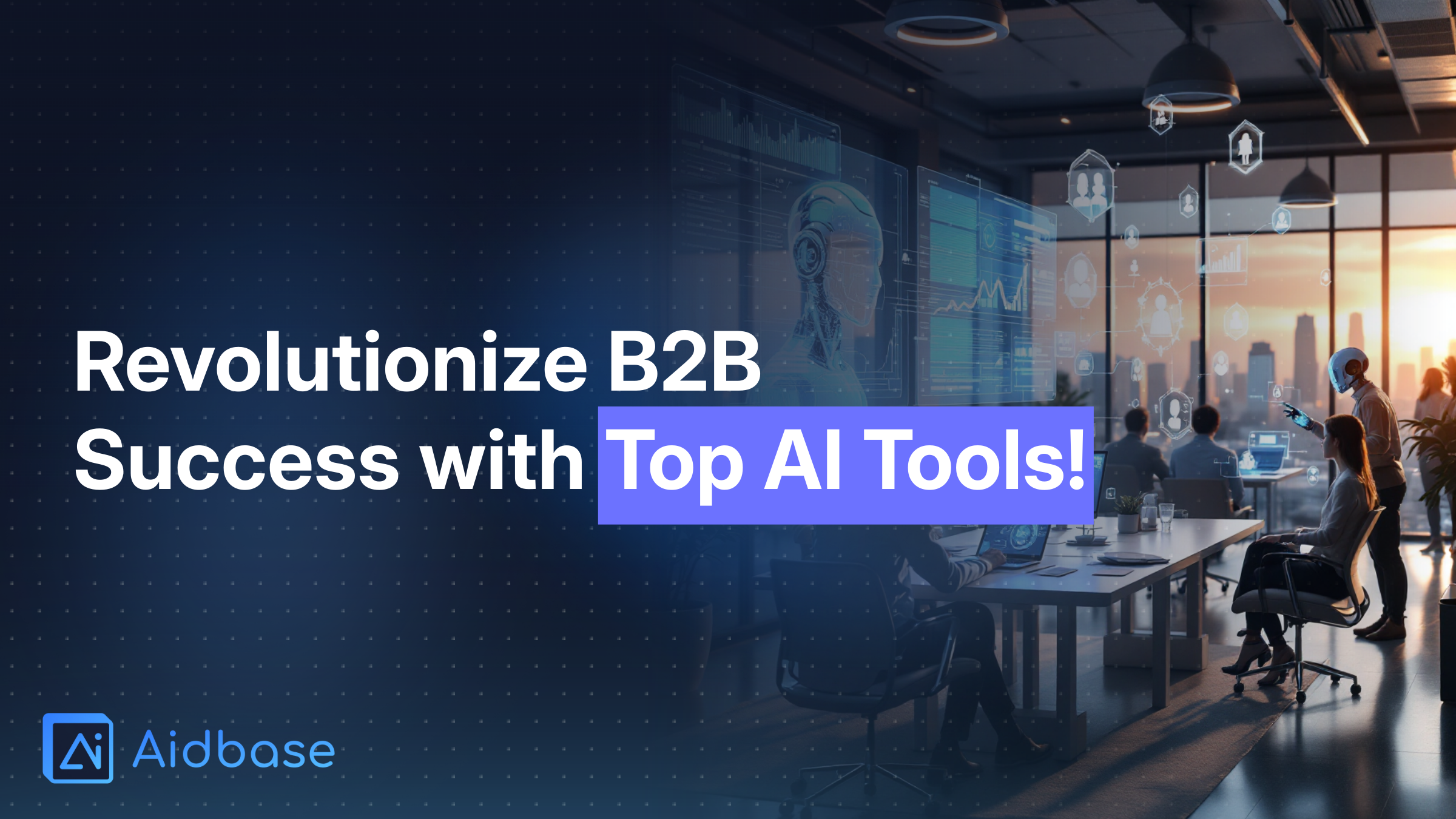In today's dynamic business landscape, artificial intelligence is revolutio...

In today's fast-paced business environment, artificial intelligence is not just a futuristic idea—it is reshaping how companies sell and support their services. B2B sales teams and customer support departments are leveraging AI to streamline lead qualification, automate onboarding, and provide personalized customer interactions. In this post, we explore how emerging AI tools are transforming the sales and support landscape in 2025.
The integration of AI in B2B operations has moved beyond buzzwords and into the realm of everyday business functions. AI tools are now deeply embedded in sales strategies, enabling teams to tackle routine tasks and focus on high-value interactions. With advancements in machine learning, natural language processing, and data analytics, AI is now capable of deciphering complex customer data, driving engagement, and predicting market trends with impressive accuracy. This rapid transformation ensures that companies are not only keeping pace with technological advancements but are also gaining a competitive edge in their industries.
Modern selling is far more complex than in previous decades. Today’s sales professionals operate in an ecosystem brimming with data, diverse customer interactions, and a need for rapid responsiveness. AI's role in modern selling includes:
Tools like Salesforce's Agentforce and Drift are at the forefront, automating tasks and reducing redundancy. For example, Drift uses AI-powered chatbots that engage website visitors in real-time, enhancing lead generation and nurturing efforts (Martech Quest). This fine-tuning of the sales process ensures that sales teams can concentrate on building deep, meaningful customer relationships.
As the sales environment evolves, innovative solutions like Aidbase are emerging to bring AI support to new levels. Aidbase harnesses the power of AI to support sales teams by automating routine tasks, integrating data seamlessly, and providing actionable insights in real time. This means sales professionals can access precise customer information and predictive analytics, ultimately leading to quicker decision-making and improved efficiency. By incorporating Aidbase, companies can ensure that both new and existing customers receive the tailored support they deserve.
One of the primary challenges in B2B sales is identifying which leads are worth pursuing. AI tools, such as Oracle's AI Agents, are transforming the qualification process by automating the analysis of vast amounts of data. These agents can:
This not only speeds up the lead qualification process but also reduces the administrative burden on salespeople, allowing them to focus on conversion tactics. You can read more about Oracle's innovative approach on Reuters.
Onboarding new customers can be a time-consuming and error-prone process without the right tools. AI-driven onboarding solutions are automating this crucial process. These tools can:
By automating onboarding tasks, companies reduce human error and speed up the time it takes for new customers to start deriving value from their products or services.
Personalization is key to winning new business. AI is enabling sales teams to offer a highly personalized experience even before the sale is made. Platforms like Clearbit and Conversica are leading the charge:
These tools ensure that every interaction is tailored to the specific needs and preferences of the customer, leading to higher engagement and conversion rates.
Real-time engagement with prospects is essential in today's digital landscape. Conversational AI tools like Drift and Botsonic enable:
For instance, Drift's chatbots engage visitors on websites in real time, asking key questions that help in categorizing leads effectively (Martech Quest). This immediate interaction fosters trust and keeps potential customers engaged from the outset.
Understanding the customer journey and sales performance is critical in refining a sales strategy. Tools like Gong.io and HubSpot Sales Hub provide AI-driven analytics to:
By leveraging these analytics, sales teams can make informed decisions and continuously improve their processes, ensuring a better overall performance.
Seamless integration with existing Customer Relationship Management (CRM) systems is vital for hassle-free operations. AI tools are now being designed to work hand-in-hand with CRMs by:
HubSpot Sales Hub is a prime example, merging robust CRM capabilities with AI-powered insights to prioritize leads and forecast which deals are most likely to close (Fueler).
Engaging customers effectively requires personalized communication and responsive support. AI tools are innovating customer engagement through:
Products like Lavender, an AI-powered writing assistant, help sales teams craft improved emails by optimizing tone, clarity, and personalization. This ensures higher engagement rates and fosters stronger customer relationships (Smarte Pro).
Chatbots have become essential for providing real-time support. These tools handle a broad range of tasks effectively, including:
Botsonic is one such tool that allows businesses to set up AI-powered chatbots capable of managing customer interactions 24/7, thereby reducing the workload on human support teams (Merlio).
Forecasting sales in an ever-changing market can be challenging. AI tools geared towards predictive analytics help businesses by:
These insights empower companies to navigate market fluctuations more adeptly, ensuring they remain proactive rather than reactive. Such a data-driven approach to forecasting is crucial for sustainable growth.
Looking ahead, the future of AI in B2B sales and support promises even more sophisticated features:
Staying abreast of these trends is critical for businesses wanting to maintain a competitive edge. As the technology evolves, so too will the tools and strategies that drive successful sales and support operations.
The transformation brought about by AI is setting a new standard for B2B sales and support. By automating lead qualification, onboarding, and personalized engagement, these innovative tools are not only reducing the administrative burden on sales teams but also enhancing the overall customer experience. Companies that embrace AI—from Oracle's AI Agents to conversational platforms like Drift and Botsonic—are poised to lead the market. Integrating these tools within an ecosystem, supported by platforms such as Aidbase, can help businesses streamline their processes, make data-driven decisions, and stay ahead in a competitive landscape. The future of B2B sales and support is undoubtedly digital, and those who adapt early will reap the rewards of improved efficiency and customer satisfaction.